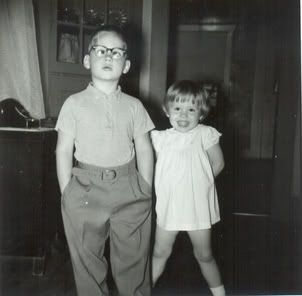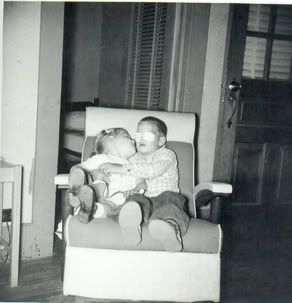Rosemary was mentally retarded. Her life was complicated when she was 23 and her family subjected her to an ill-advised pre-frontal lobotomy. At the time, medical experts thought such an operation would protect Rosemary and the family from her radical changes in moods and prevent behavior which could be "an embarrassment" to the Kennedy family. Read that to mean: Rosemary was a bit of a wild child at that point in her life. Her biological urges outraced her reasoning abilities. The Kennedys feared pregnancy and/or disease. She already had become adept at escaping from the convent where she lived at the time.
After the lobotomy, Rosemary was reduced to an infantile state, having lost the ability to think and communicate nearly entirely. Before the surgery (I so want to call it butchery, but it was considered the best option at the time), Rosemary had been able to keep diaries of her social activities -- not something every mentally retarded young adult could manage to do. It is so tempting to wonder "what if" the lobotomy had not been performed... what could Rosemary have accomplished with the skills she had been born with?
There's little point in wondering. What was done, was done. Of course, 60 years later it is easy to look back and say "how in the world!" But the decision was made with the best possible advice that was available at the time, we must remember.
As the President's sister, Rosemary brought a greater focus to the lives of mentally retarded people overall. Because of her, Special Olympics was formed by Eunice and Sargant Shriver, giving mentally handicapped children the ability to show everything they ARE capable of accomplishing.
Because of Rosemary, society and families have advanced in their treatment of the mentally retarded and those with physical disabilities. State homes that acted as warehouses were shut down. Families stopped closeting members who were handicapped. Society started looking at the gifts and abilities of all people and started making room for them to be used and shared.
Why does this concern me so much?
Because I had a brother, Bob, who was both mentally retarded and physically handicapped.
And because, today, on a bulletin board I frequent, some ass decided he would post "The Retard Kennedy Died." His post was filled with horrible, thoughtless, hurtful words, including "retard" and "gimp."
I so thought we were past that. So did a lot of other people who joined me in lambasting the fool.
He was offended that the moderators edited his post to take out the most offensive terms. His reaction, equally offensive, won him a week's banishment from that board. We'll see if he learns anything.
My Bob was a couple of weeks short of his 44th birthday when he died in 1997.
He filled his days listening to the police scanner for the town gossip,
figuring out how things work and playing with his beagle, Tippy.
Bob never worked; his job in life simply was to be who he was, and he did
it well.
We were blessed to have grown up in a small Oklahoma town. Bob had the
chance to be at home there, which wouldn't have been possible in a larger
city. People knew Bob, and were patient with him. They listened to him even
when it was hard to understand him. And that's all that really mattered
to him, because he liked to talk.
Education and training opportunities for Bob and his peers were severely limited in our hometown in the 1960s. Bob attended special school until he was 12; from that age on, he was at home, under our mother's care. There was no need for assisted living, or group homes, or institutionalization in our family. We were lucky that it was possible for Bob and Mom to live together and take care of each other.
He was fascinated with power tools and electricity, and his week was not
complete without several hours of how-to programs on public television.
Employees in all the hardware stores in town knew Bob and his latest
project.
He finished few, but finishing was never the point to any of Bob's
projects. One work he did complete has a permanent home in my kitchen - a
simple wooden stepstool he made so I could reach my cabinets. I use it
every day.
Yes, Bob's main job was simply to be who he was. He needed no day planner;
scheduling wasn't important. There was no rat race, no corporate ladder
that needed climbing. He lived on God's timetable.
His needs were simple - eating a grilled cheese sandwich, visiting with
his bingo buddies, studying the displays at the hardware store, playing
the piano by ear.
But he had goals, and worked toward those until he achieved them. Most of
them were goals he had for helping someone else, including me. I learned
how to rewire lamps by watching him.
His last big goal was to help me buy a dishwasher for the old house I had
recently bought. His last Thanksgiving, he handed me an envelope filled with
money; he had saved his allowance until he could afford my
Christmas present, the dishwasher.
He wanted to make sure I bought it before Christmas. I did, but it remained
in the carton, uninstalled, for almost a year because I didn't made the time in my
over-scheduled life to get it put in. I wish he could have seen it work.
Christmas was the big day of the year for him, because that was when he
could give his presents. It was impossible for him to keep a secret, though,
so we always knew what was under the tree before we unwrapped our packages.
Bob didn't understand much about religion or theology, but he knew the
Christmas story, and he believed in angels and heaven. Before it became
physically difficult for him to attend, he enjoyed going to church,
especially to hear the music and to visit with his friends.
He prayed for people instinctively. I think that's why he loved gospel
music so much; the messages in the music were already rooted in who he was.
He died, peacefully, in his sleep. Mom tried to wake him so he wouldn't
miss hearing Paul Harvey on the radio, but the angels had already visited
in the night and told him the rest of the story.
It seemed right, somehow, that many of his bingo buddies heard the news
on the police scanner.


Here are a couple of photos from our preschool days, before and after he had surgery to correct his crossed eyes. How can anyone make horrible comments about such a loving brother?

5 comments:
What a wonderful brother you had. I have a
cousin Gary that has the mental age of a 5
yr old. His now unable to walk, can't see
much because of cadiracks. My great aunt
passed away last year. She live as long
as she did because she knew no one one
could or would care for Gary. He went to
live in Calif with one of his 2 sisters.
But that did not last. He is now in a
nursing home of some kind. Gary is 63
I wish I could have met Bob. He sounds like he was really cool. I know you miss him. I'm glad you have good memories of him to cherish.
Y'all were both QT 22/7's!
That's the math formula for "pi" ... so I guess that made me a cutie pi!
Hee hee ... thanks E.R.
Very good! Check it out: http://www.cecm.sfu.ca/pi/pi.html
Post a Comment